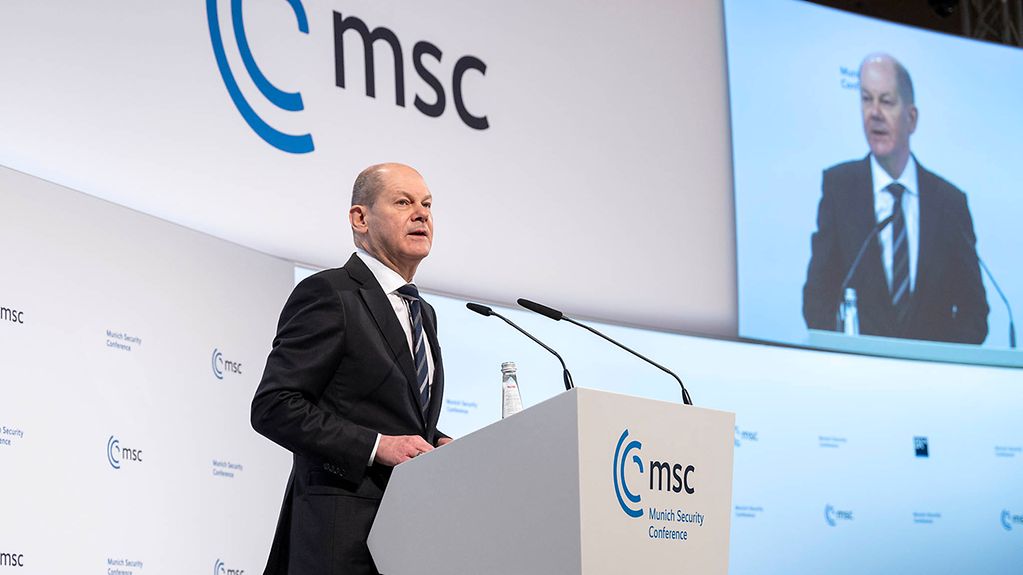Federal Chancellor Scholz at the Munich Security Conference
At the Munich Security Conference, Federal Chancellor Scholz reiterated that Germany stands by Ukraine. And he underlined the importance of Europe – “as a strong pillar in the transatlantic alliance, an unmistakable voice for democracy, freedom and justice, and America’s closest friend.”
3 min reading time

Federal Chancellor Scholz at the Munich Security Conference: “We are prepared to negotiate.”
Photo: Bundesregierung/Bergmann
In his speech at the Munich Security Conference, Federal Chancellor Olaf Scholz addressed the pressing conflict between Russia and Ukraine. There was no justification for the deployment of Russian forces on the Ukrainian border, said Scholz, adding that Germany was still prepared to negotiate.
“As much diplomacy as possible without being naïve – this is what we aspire to,” said the Federal Chancellor. He again signalled a willingness to engage in talks and find a diplomatic solution to the conflict. The acceptance of borders and the sovereignty of states was the sole principle that applied when it came to securing peace in Europe, he said.
“Of course I have no illusions. We can’t expect a swift breakthrough here. But we will only be able to counter the momentum of the crisis by engaging in negotiations. After all, nothing less than peace in Europe is at stake.”
Germany’s role and responsibility as a NATO partner
Speaking on the subject of the transatlantic alliance and the question of burden-sharing among allies, Scholz said: “Aircraft ready to fly, ships that can set sail, soldiers who are well-equipped to perform their dangerous duties – a country of our size that has a special responsibility in Europe must be able to provide all of this. We owe this to our allies in NATO, too.”
The Federal Chancellor emphasised that Germany stands by the Article 5 guarantee – without any ifs or buts. Practical solidarity in terms of a greater presence of the Federal Armed Forces in the Baltic States and air policing by NATO in the southeast of the alliance clearly reflected this, said Scholz.
European sovereignty as a chance to remain a “power among powers”
He described the role of Germany and that of a united, free, peaceful and sovereign European Union as an opportunity to remain a “power among powers”. The European Union was not directed against anyone, he said – and it certainly was not a risk to transatlantic cohesion. On the contrary:
“Ultimately, only a Europe capable of action will remain an attractive partner for the United States: as a strong European pillar in the transatlantic alliance, an unmistakable voice for democracy, freedom and justice, and America’s closest friend and partner,” said Scholz.
Democracy as a basis and goal
Federal Chancellor Scholz was particularly emphatic in saying that democracies were more adaptable and resilient in the long term because freedom of expression and diversity of opinion, free elections, the recognition of political opposition, and the protection of minorities ensured balance in society.
The free, democratic model of society was not without competition, he said. “But we can confidently say that the the model has held its ground,” said Scholz. “A life of freedom, justice and dignity is not an exclusively ‘Western’ aspiration – it is a deeply human, universal one.”
Bilateral talks on the sidelines of the Security Conference
On the sidelines of the MSC, Olaf Scholz took the opportunity to hold bilateral talks with NATO Secretary General Jens Stoltenberg, Vice President of the United States of America Kamala Harris, Speaker of the US House of RepresentativesNancy Pelosi, President of Ukraine Volodymyr Zelensky and UK Prime Minister Boris Johnson.
The Munich Security Conference is considered the world’s most important meeting of experts on security policy. Held every year since 1963, the international meeting enables politicians, military and business representatives, non-governmental organisations and experts on security-related issues to hold talks without being subject to diplomatic and protocol requirements. The aim is to conduct a broad debate on current foreign, security and defence policy issues.